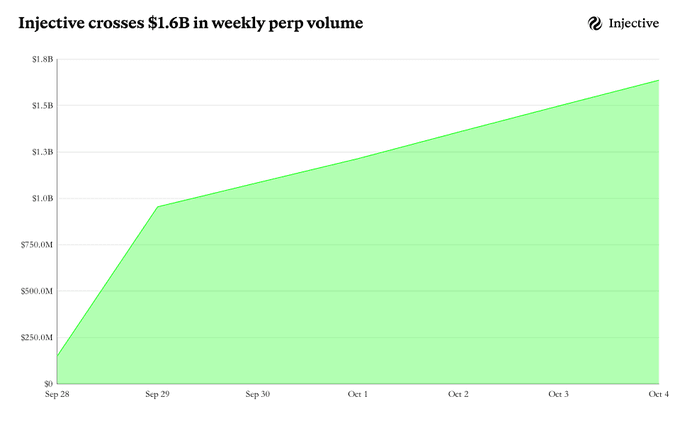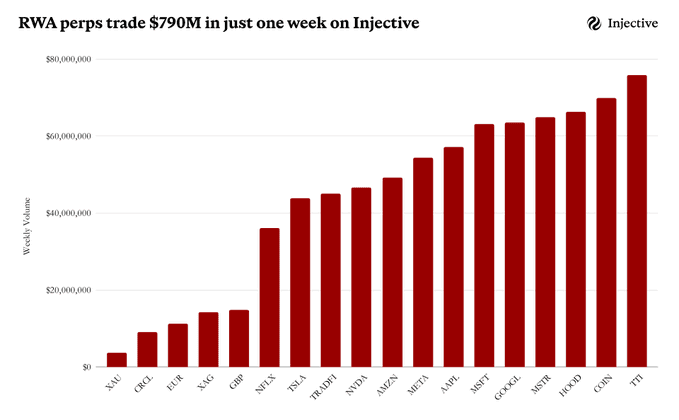Looking at Injective @injective's recent series of actions, I realize we may be witnessing a public chain specially built for finance finding its rhythm.
Just last week, Injective handled over $1.6 billion in perpetual contract trading volume, with real-world asset (RWA) perpetual contracts contributing $790 million, setting a record for the highest weekly volume since its launch in late January this year. This figure becomes even more intriguing when placed in the context of overall on-chain asset trading — according to RWA.xyz, the total on-chain stock transfer volume across all chains this year so far is only $1.5 billion, while Injective alone has achieved $3 billion in stock perpetual contract trading volume.

This growth is not isolated. Pineapple Financial has just launched a $100 million digital asset treasury and completed its first INJ purchase on the open market, totaling 678,353 tokens, valued at approximately $8.9 million. The company plans to stake all tokens on-chain, targeting an annual yield of about 12.75%, which is nearly twice that of Ethereum and about 1.8 times that of Solana. According to their plans, this is just the beginning, with the ultimate goal of becoming the largest holder and staker of INJ.
More interestingly, the entry of traditional financial institutions is not coincidental. Pineapple CEO Shubha Dasgupta and Injective Labs co-founder Eric Chen both clearly stated that this move aims to strengthen Injective's positioning as a financial application-oriented public chain. The actual data shows this positioning is having an effect.
Looking at the specific composition of RWA perpetual contracts reveals market preferences. Major tech companies such as Apple, Microsoft, Google, Meta, Amazon, and Nvidia account for about 40% of the total trading volume, approximately $315 million. This indicates that on-chain participants increasingly view these large tech stocks as core allocations for RWA—liquid, stable, and easily tradable through Injective perpetual contracts.
At the same time, crypto-related stocks have also performed well. Coinbase, Robinhood, and MicroStrategy collectively contributed about 25% of the total trading volume, and traders clearly see these ‘crypto beta stocks’ as leveraged tools for measuring digital asset sentiment.
But what truly makes me think Injective might have something unique is its product iteration capability. As trading volume surges, they have also launched groundbreaking products: just after October, the core exchange in the Injective ecosystem, Helix @HelixMarkets, suddenly dropped a bomb: launching perpetual contracts for unlisted companies like OpenAI, officially introducing an on-chain Pre-IPO market. For the first time ever, users can trade stocks of large private companies like OpenAI, SpaceX, Anthropic AI, and Perplexity AI using leverage. This is not just another new feature—it opens up a $2 trillion Pre-IPO market. This massive $2 trillion Pre-IPO market has a potential user base of hundreds of millions globally, eager to invest in high-growth tech firms but lacking access, providing immense market space.
Previously, this type of asset was once monopolized by top institutions such as investment banks and large capital. The complex KYC restrictions and limits on investment amounts created barriers that deterred ordinary investors. Now, we are pleasantly surprised to find that purchasing equity in these Pre-IPO companies or contracts related to U.S. stocks on Helix requires no KYC process.
Meanwhile, Helix has launched the ‘Trading Volume = Victory Gift Package’ reward event, where every $1,000 traded gives users more opportunities to share in a $25,000 prize pool, marking the dawn of a new era for perpetual contracts on Helix.

From actual performance, the market has reacted positively to this innovation. Since its launch, the total trading volume of the OPENAI/USDT trading pair has exceeded $3.6 million, allowing users to trade on major Injective applications like Helix with leverage up to 5 times. Considering this is just the beginning, with more companies launching in October, the potential of this market has significant room for release.
On the product front, the launch of the Injective unified bridge is also noteworthy. This cross-chain bridge, praised as ‘the fastest in the industry with unparalleled user experience,’ aims to allow users to access any asset on any chain with one click. Launching such a significant infrastructure alongside major releases in the Pre-IPO market truly showcases the team's execution capabilities.
From a broader perspective, these developments are forming a virtuous cycle. More trading volume attracts more liquidity, better products attract more users, and institutions like Pineapple provide a stable staking foundation and income source for the entire ecosystem. When Rex Shares and @OspreyFunds submitted applications to the U.S. SEC to launch staking $INJ ETFs, this cycle seems to be gaining recognition in traditional finance.
From an investment perspective, there are several key points worth considering. First, INJ's role as the core asset of the ecosystem is strengthening, whether through staking for yield or as a mechanism for consuming transaction fees, creating substantial demand. Second, Injective seems to have found its market positioning—not trying to do everything but focusing on financial applications, especially trading-related scenarios. Third, its product iteration speed demonstrates the team's technical capabilities and execution strength.
Ella @ellazhang516, head of Yzi Labs, recently mentioned that they began supporting the DEX ecosystem seven years ago, starting with the incubation of Injective, and they continue to monitor and support its development. This long-term commitment is particularly valuable in the rapidly changing crypto world.
Returning to the data itself, the trading volume of RWA perpetual contracts on Injective has approached $4 billion this year to date. At this rate, it could reach about $5 billion by the end of the year, but if the recent growth rate is maintained, the actual number may far exceed this expectation.


